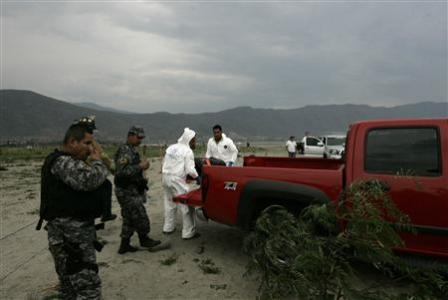(Reuters) – For decades, American and Canadian expats have flocked to the shores of Chapala, seeking refuge in the spring-like climate of Mexico’s largest natural lake, where English author D.H. Lawrence once came for inspiration.

But the calm of the clustered lakeside retreats was shattered last month when suspected drug-gang hitmen kidnapped a group of Mexican locals and dumped 18 decapitated bodies in two vehicles just miles (kilometers) from the lakeside tourist enclave of Ajijic.
The explosion of violence followed months of escalating tension in a turf war between the Sinaloa and Zetas drug cartels that has spread from smuggling routes in the north to the fringes of Mexico’s second biggest city, Guadalajara.
Just 40 minutes from the Jalisco state capital, the Chapala slayings horrified foreigners and locals alike, who locked themselves indoors and stopped going out.
“We thought it was going to be the end of Ajijic,” said Phil Rylett, a 61-year-old retiree from Sacramento, California, who was in the picturesque village finalizing plans to buy a house with his wife. “You can’t live in paradise if you’re afraid.”
Cross-border tourism to Mexico has been a notable victim of the drug war, which has killed more than 55,000 people since President Felipe Calderon launched an army-led offensive against the cartels shortly after taking office in December 2006.
The number of day trippers to Mexico fell by a quarter between 2008 and 2011 and the numbers of U.S. tourists staying also declined three percent last year, despite a rise in the total number of international tourists, official data show.
But for all that, more and more Americans are coming to live in Mexico, seeking the lower cost of living and escaping the tough U.S. economy. The U.S. Embassy estimates over 1 million reside in the country now, up by more than a quarter from 2010.
Between 7,000 and 17,000 U.S. and Canadians live in Chapala depending on the season, making it the oldest and biggest concentration of U.S. expats in Mexico.
Despite the violence, most expats are staying put for now.
In February, the U.S. State Department issued its widest warning since 2006, advising against “non-essential travel” to 14 of Mexico’s 31 states. It noted that the number of U.S. citizens murdered in Mexico had jumped from 35 in 2007 to 120 in 2011.
Calderon’s failure to contain the violence has eroded support for his National Action Party (PAN) which polls show is likely to lose the presidential elections due on July 1.
RIPPLE EFFECT
American residents across the country have been closely monitoring developments in Chapala, said Richard Kiy, president of the International Community Foundation, which has extensively surveyed the U.S. population in Mexico. As recently as October 2011, respondents overwhelmingly reported feeling safe.
According to residents and authorities, Zeta gang members kidnapped 32 people from the Chapala area in late April and early May, including three waiters walking home from their night shift at a lakeside restaurant and a 17-year-old girl.
“This time these were innocent people that they just snatched off the street,” said Terry Vidal, 52, executive director of the Lake Chapala Society, which caters to expats.
“These were the children of our maids and gardeners and our colleagues. We were terrified,” he added.
A Belgian resident who came across the attackers while walking his dogs was also kidnapped, and later released. He and his family have since left Mexico, locals said.
Twelve Mexicans managed to escape their captors, but on May 9, police found the dismembered remains of the 18 bodies stuffed into SUVs. Some had been refrigerated.
Six of the Chapala victims were affiliated with drug cartels but the rest did not appear to have any connection to organized crime, said Lino Gonzalez, a spokesman for Jalisco prosecutors.
Police arrested four people over the murders and are still investigating. The suspected ringleader of the gang, Juan Carlos Mercado, told police they selected people at random, intending to leave the bodies beneath Guadalajara’s Millennium Arches to spread fear.
SHUT DOWN
In the ensuing weeks, the Chapala area “completely shut down,” according to Vidal. Parents pulled their children out of school. Streets emptied. Some foreign residents left, waiting to see if things would “settle down,” Vidal said.
But those who remained were galvanized.
Through the Community Safety Initiative, a Chapala group founded after a U.S. citizen was killed in a botched robbery here last November, they pushed for more safety measures, including security cameras and 24-hour cell phone numbers for officers on patrol. Some formed neighborhood watch groups.
Since the killings, residents say things have calmed down. Restaurants are opening up again, children have returned to school. Expats say that while they are more cautious, they are staying put, believing they are not targets.
“They’re not after us,” said Victoria Schmidt, 55, who manages the American Legion Post 7 in Chapala. “But we’re extremely concerned about our Mexican friends.”
The teenager who walked Schmidt’s dogs quit because he did not want to be on the streets, she said. When one of her waiters at the Legion failed to show up this month, Schmidt panicked, thinking he had been kidnapped. He was ill.
“This has changed our reality,” she said. “Most of the people who live here feel like we live in paradise. But now, well, it’s different.”
Any increase in the violence could prompt expatriates to cut and run.
“If the American community in Ajijic starts to feel insecure it could have a ripple effect across the country,” Kiy said.
It is unclear what long-term impact the killings may have as they occurred at the end of the tourist season. The real test will be in November, when it picks up again. Real estate agents say sales have slowed in the past month, but not dramatically.
Expats say another similar atrocity could rip the community apart. Back in Sacramento, Rylett said he and his wife still plan on returning to buy their dream home.
“We’re hoping it was an isolated tragedy,” he said. “But if there are more disturbing incidents, we’ll rethink our plans.”
(Editing by Dave Graham, Simon Gardner and Vicki Allen)





